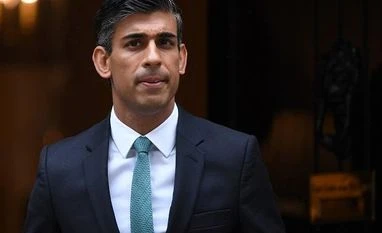Rishi Sunak won an endorsement from financial markets in his first days as prime minister, and even some favorable polling numbers from the British public. His first full week in power may be more challenging.
The new premier’s economic policy is set to face scrutiny as the Bank of England delivers what could be its biggest interest-rate hike in more than 30 years, and the government looks to fill the multi-billion hole in the nation’s finances before a fiscal statement next month.
Meanwhile, questions continue to swirl over security breaches by his Home Secretary Suella Braverman, calling into doubt Sunak’s political judgment in reappointing her to the position.
It all adds up to a difficult challenge for Sunak, who put economic competence and integrity at the heart of his pitch to voters. Despite the turmoil caused by his predecessor Liz Truss, polling for the Observer last weekend showed Sunak and his party have overturned Labour’s lead in terms of who voters trust most to manage the economy. He’s also eaten into the opposition’s record advantage in surveys of voting intentions.
But those bounces risk fading once Sunak is confronted with the economic reality of soaring borrowing costs and the risk of a prolonged recession. Those dangers could be laid bare by the BOE on Thursday, when it presents economic forecasts along with its latest rate decision.
Economists and investors expect the UK central bank to raise its benchmark lending rate by three-quarters of a percentage point to 3% on Nov. 3 -- the highest since 2008 and the biggest single increase in 33 years.
Households are already paying more for new mortgages, and businesses are complaining about the rising cost of credit. But instead of being in a position to offer long-term aid and policies to boost growth, Sunak is scrambling to cut spending and restore the country’s fiscal credibility in the wake of Truss’s disastrous administration.
The weekend newspapers gave a flavor of the choices Sunak and his Chancellor of the Exchequer Jeremy Hunt must make to find up to £50 billion of tax rises and spending cuts before Nov. 17’s Autumn Statement.
The Telegraph reported the government is considering freezing the foreign aid budget for another two years, backtracking on a 2020 plan to revert to pre-Covid levels of international development spending, while the Sun said some Cabinet ministers are pushing for a tax on non-UK citizens who live overseas and own property in Britain.
The Financial Times said Sunak is considering getting rid of an energy revenue cap plan proposed by his predecessor and instead expanding a windfall tax on producers, while the Times said he was cooling on plans for a similar levy on banks.
Braverman Woes
But, if the delay of the government’s fiscal plan, which had been due tomorrow, means economic decisions can be slightly deferred for now, questions about the home secretary are becoming increasingly pressing.
Sunak has come under fire for reappointing Braverman from both the opposition Labour Party and some Tory allies. Labour has called for the government to make public its review of the security breach and denounced the reappointment as a “grubby deal” that was payback for supporting Sunak’s bid to replace Truss.
Braverman stepped down on Oct. 19 after acknowledging sending sensitive information in an email from her personal account, and said she “rapidly” reported it as soon as she realized the breach. Sunak reappointed her six days after her resignation when he replaced Truss.
The BBC reported that prior to acknowledging the breach, Braverman sent an email to the initial recipient of the information asking the person to delete and ignore the message. It also reported it may have been hours before she reported the security breach.
Cabinet minister Michael Gove defended her reappointment on Sunday, saying the public and the media shouldn’t rush to judgment. He said that making more details public could itself be a threat to national security, but that he was glad Sunak gave Braverman a second chance and that she was “absolutely” a politician of integrity.
Braverman is also coming under pressure as tensions mount over a jump in the number of migrants crossing the English Channel from France, despite the government’s pledge to crack down on arrivals. A Border Force migrant centre was attacked with fire bombs Sunday. No one was injured, though the attacker killed himself after throwing three fire bombs, Reuters reported.
The home secretary said Sunday the incident was distressing and she was receiving regular updates.
The attack came a day after almost 1,000 migrants are estimated to have successfully crossed the channel, the highest daily number for weeks. Nearly 40,000 have reached the UK so far this year. Asylum processing centres are overwhelmed, and David Neal, the chief inspector of borders and immigration, told MPs last week that he was left speechless after visiting the Manston centre in Kent where conditions were “wretched.”
Gove also defended Braverman after a report that she had failed to act on the warnings about Manston, but acknowledged in an interview with Sky News that the situation at the centre “is not what it should be.”
Braverman, is considered a hardliner on immigration and said earlier this month that was her “dream” to fly asylum seekers to Rwanda for processing, a policy of Boris Johnson’s erstwhile administration.
Unlock 30+ premium stories daily hand-picked by our editors, across devices on browser and app.
Pick your 5 favourite companies, get a daily email with all news updates on them.
Full access to our intuitive epaper - clip, save, share articles from any device; newspaper archives from 2006.
Preferential invites to Business Standard events.
Curated newsletters on markets, personal finance, policy & politics, start-ups, technology, and more.
)